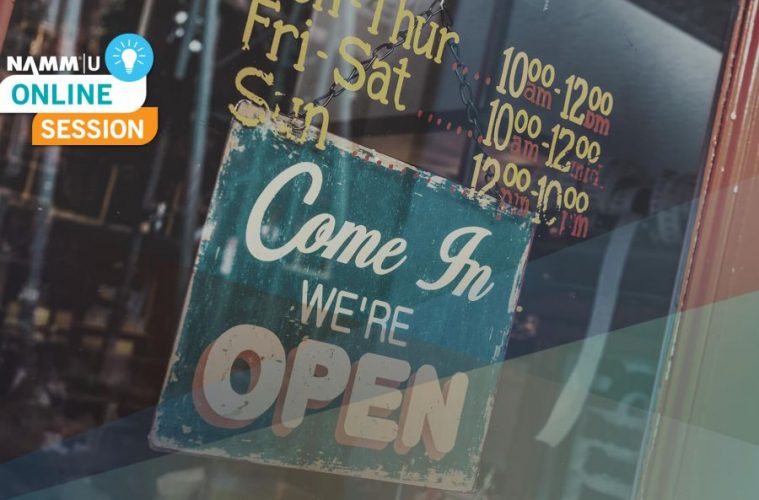Bob Phibbs, “The Retail Doctor,” on May 7 presented a NAMM webinar entitled “COVID-19 Small Business Update: Key Issues to Consider as You Re-Open for Business,” where he presented a five-step plan for MI retailers to consider when reopening a store. He also dubbed this session “Reopening with Hope: What You Need to Plan For, Rethink and Buy to Reopen Your Doors.” Here are Phibbs’ recommendations:
A plan for doing your own due diligence
“In the last eight weeks, trust has been broken,” said Phibbs. “Trust for the government to take care of us, trust for our public health, trust for our politicians, trust of our banking system, trust of the stock market, and even trust our own family can keep us safe has all been broken. Suddenly, we are looking around and saying, ‘Wow, this is very different.’ This cosmic shellshock we’ve all [had] is affecting everything. It especially affects retail, because we are the signs of a new world.”
The solution to this problem is to do “everything in your power to regain that trust and make people feel safe and welcome again.”
“Anything touchable needs to be regularly sanitized,” said Phibbs. “Heavily touched surfaces should be cleaned every 30 minutes or more. … Doing due diligence means you are going to need to wear a mask, even if you personally think it is unnecessary or your governor doesn’t require it. It is not about you. It is about your customers.”
Phibbs pointed to a survey that said 86 percent of people would not go into a store where people were not wearing masks and gloves, with the latter part dependent on what they are selling. “What that means is, they are already afraid walking in and need to be reassured,” he said.
As for types of masks, Phibbs noted retailers should not look scary or “surgical.” Finding someone who can create a mask with your store logo can really work well. Etsy is one place to find people who can sell these products, he suggested.
Concerning customers wearing masks, Phibbs stated retailers must decide based upon state rules. However, he said a great way to get customers to wear masks in your store is to encourage them to take pictures of the mask, post them on your social media page with a hashtag and reward them with something. The goal is to make things seem normal, but retailers must manage the optics.
A plan for leading your team
Trust is also broken for retail employees that were furloughed. “You have to rebuild your team,” said Phibbs. “They are shell shocked.”
Quickly, MI store employees must know proper sanitizing practices and much more. “You have to have a meeting with everybody,” stressed Phibbs. “… Give your staff a script for the top four questions you think they will be asked and then role play with [the employees] as much as you can so they feel confident with it.”
Phibbs took it one step further, recommending employees sign a sheet saying they understand everything they were told and are willing to perform those duties with new procedures. The store owner should keep a copy of these signed documents.
A plan for your “new” business
Customer demand is likely to be only 30 percent to 40 percent of what it would be during normal times, noted Phibbs. “Think of this like you are opening a new business,” he said. “It is actually going to be better than the last one.”
This involves rethinking a lot of things, including sales training, if employees know how to upsell and are they suggesting add-ons. “You are going to have to get more out of people that are coming in,” said Phibbs. “More so than getting new customers.
“Don’t expect employees to do it automatically,” he continued. “You have to train it, then practice it first. … It’s not just a matter of having someone know how to play the instrument. Can they get someone to nurture that little flame of desire, so they say, ‘I want to upgrade to the next big thing.’”
A plan for caring for your customers, not waiting on them
“We have to make shopping fun,” stated Phibbs. “We have to remember we are a music store. We are not a hospital. We are trying to have fun with this. Some people wonder if they need to sacrifice a goat to figure it out. No, we need to think about how we interact with customers in a new way and make sure you train your staff how to interact with people.”
Do not ever talk about the news with customers inside the store, Phibbs asserted. “If I had a sign on my door, it would say, ‘Escape the News With Our Music,’” he said.
Focus on human connection, Phibbs continued. “[Customers] are here for hope. They are here to upgrade. They are here for a lesson. They are here for fun,” he said. “People are buying hope, and your employees have to deliver that. … People who feel they matter buy from you. Those that don’t, don’t [buy from you].
Building hope
“Why is hope important?” Phibbs asked. “When you have hope, you are looking forward. You gain energy in the feeling of potential.
“But hope is not a strategy,” he cautioned. “You can’t say you hope [COVID-19] will get better. You need to take action.”
For more news updates from the Music & Sound Retailer, click here.


